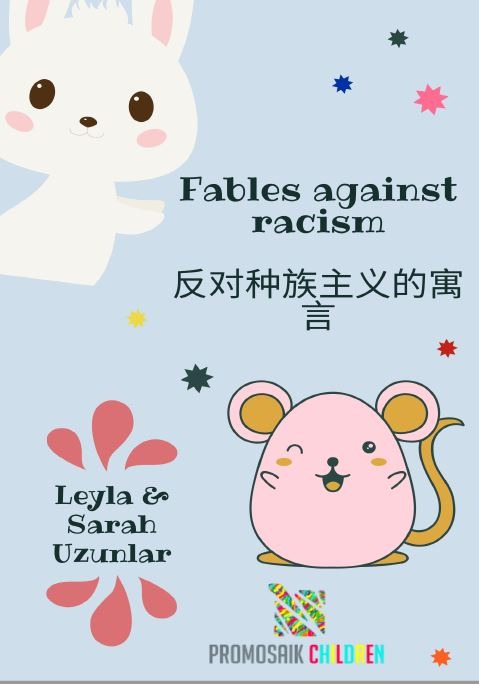
Children, who love fables in which animals have human traits, also love inventing new fables. Such fables, however, must also have happy endings. And if fables about racism are to be told, then they too must have happy endings with the racism being eradicated within one or two pages.
With these five fables included in the STOP RACISM series — FABLES AGAINST RACISM — ProMosaik would like to promote the concept of a world without racism. The fables were written by two children from Istanbul, living within a bicultural Italian and Turkish environment.
The fables published in this booklet would like to share a powerful message for dialogue and engagement against racism and discrimination which occur within all social, cultural, and religious groups.
In our first edition of 2017, we decided to translate the fables into eleven languages to get a constellation of six European languages (Italian, German, English, French, Spanish, and Greek) and six languages from the Muslim world (Turkish, Kurmanji-Kurdish, Arabic, Persian, Pashto, and Bahasa).
We believe that in this context the fable will be the ideal literary form to promote intercultural dialogue because it is strongly anchored in the European culture with Aesop and Phaedrus, while the Islamic culture has acquired the treasure of the Indian fables of Kalila and Dimna through their translation from Sanskrit into Persian and Arabic.
This new Chinese edition pursues the same aim and is addressed to all Chinese children.
孩子们喜欢寓言中的动物有人类的特点,也喜欢新创作的的寓言故事。然而,这样的寓言也必须有美好的结局。如果要讲关于种族主义的寓言,那么它们也必须有一个圆满的结局,种族主义在一两页之内就被根除了。
在“制止种族主义”系列的第五个寓言“反对种族主义的寓言”中,ProMosaik想倡导一个没有种族主义的世界的概念。这个寓言是两个来自伊斯坦布尔的孩子写的,他们生活在意大利和土耳其的双重文化环境中。
本册用十二种语言出版该寓言故事,想分享故事里强有感召力的信息去对话和参与到反对在整个社会、文化和宗教团体中发生的种族主义和歧视现象中去。
我们决定将这个寓言翻译成11种语言,以获得六种欧洲语言(意大利语、德语、英语、法语、西班牙语和希腊语)和穆斯林世界的六种语言(土耳其语、库尔曼吉语、库尔德语、阿拉伯语、波斯语、普什图语和巴哈萨语)。
我们相信,在这种情况下,寓言将是促进跨文化对话的理想文学形式,因为它与伊索和斐德鲁斯紧密地扎根在欧洲文化中,而伊斯兰文化通过将梵语翻译成波斯语和阿拉伯语,获得了印度卡利拉和迪姆纳13个寓言故事的宝藏。
Video in Chinese:
